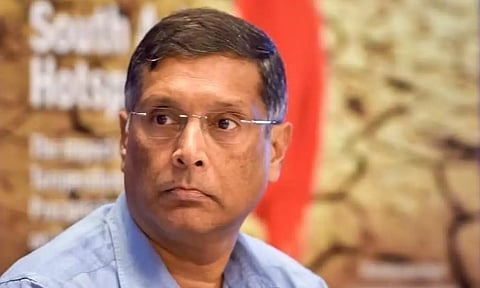2026 delimitation will increase disaffection between ‘rich’ South & poor Hindi heartland states: Arvind Subramanian
CHENNAI: Amid a tiring statement war between Union Finance Minister Nirmala Sitharaman and her Tamil Nadu counterpart Thangam Thennarasu over the devolution of Central tax revenues to developed states, former Chief Economic Advisor of India Arvind Subramanian, cautioned that the disaffection between the 'rich' southern states and 'poor' Hindi heartland states would increase after the delimitation exercise of 2026.
Participating in a panel discussion on "The big bets for Tamil Nadu's Trillion US dollar economy" moderated by Menaka Doshi, senior editor of Bloomberg India at the two-day Global Investors Meet 2024 organized by the state government here, Arvind Subramanian said, "The devolution (of central taxes) has a big amount of redistribution, going from the richer southern states to the poorer Hindi heartland states. That is a part of national building, keeping India together. But over time, when other things went bad, southern states are increasingly saying "Why should we contribute to the redistribution consistently over time."
Wedge between fiscal contribution and political power will rise
"The big moment is going to be in 2026 when the delimitation commission gives more power to the Hindi heartland relative to the southern states with slow population growth. That disaffection will grow because the southern states will say we contribute more in terms of fiscally and we are losing political power. The wedge between fiscal contribution and political power is going to rise over time," he cautioned.
Quick to suggest a remedy to the richer states, the member of the Economic Advisory Council to the Tamil Nadu Chief Minister said, "I don't want to paint too dire a picture. But over time we need a little bit of re-correction in the fiscal arrangements so that the southern states including Tamil Nadu tend to retain a slightly larger portion of resources that are coming from the Centre. That has to be a part of the new social contract going forward."
TN must augment own revenue
Asked to suggest options the rich states like TN could explore in the event of devolution not being ideal, the former CEA referred to the revenue resources like stamp duty, liquor policy, petroleum, and property taxes available to the state and said,
"We are advising the government on how to augment revenue in relation to stamp duty, property taxes, and also improving administration of the GST. If this is improved sustainably, the state would get one percent of GSDP, which is not small. For a state like Tamil Nadu, it would be something like Rs 30,000 or 40,000 crore. Those are things the state should actively consider, and which would help the state in the long run.
Offering a glimpse of his economic wisdom to the eager audience, former RBI Governor and another member of the CM's advisory council Mr Raghuram Rajan said that devolution of more functions to municipalities was another way for the state to raise funds.
Arvind Subramaniam, who concurred with his fellow panel member on the idea flagged without hesitation that one of the lessons he had learnt from his study of Indian economic history was that the country was overdoing decentralization.
Categorically disagreeing with his contemporary, Rajan said, "We have done it (decentralization) yet, " leaving the audience briefly amused.

